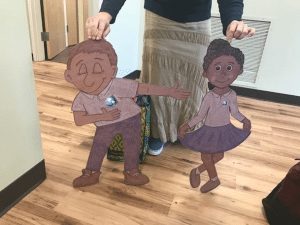The First Friendships: Social Learning in Toddlerhood
The toddler years are a time of tremendous change. Between eighteen months and three years, children move from solitary exploration to a world rich with social connection. They begin to notice the people around them, imitate their peers, and take the first steps toward friendship. These early relationships are more than playmates for the moment. They are the foundation for empathy, cooperation, and lifelong social confidence.
The Montessori toddler classroom is designed for independence, self-care skills, and nurturing first social bonds. The careful balance of freedom and structure provides toddlers with meaningful opportunities to practice kindness, share space, and learn to navigate the joys and challenges of being with others.
How Toddlers First Connect
During the earliest toddler months, children play side-by-side rather than directly with one another. This is called parallel play. While it might seem like they are not yet interacting, they are observing each other closely, taking in language, movement, and emotional cues. Gradually, they begin to mirror actions, exchange smiles, and engage in simple give-and-take activities.
These moments are key to toddler social development Montessori educators observe daily. A child may hand a block to a peer without prompting, or follow another to a work rug to see what they are doing. This type of engagement builds the understanding that relationships are a source of joy and learning.
The Montessori Approach to Social Learning
In a Montessori environment, children have large portions of the day for self-chosen work, which naturally leads to organic social interaction. Instead of being told when and how to play together, toddlers learn to join a peer because they are genuinely interested in what that child is doing.
Practical Life activities are a particularly rich area for social learning. A toddler might carry a pitcher of water to a friend’s table, or two children might wash a table together, passing the sponge back and forth. These shared tasks offer natural practice in turn-taking, cooperation, and problem-solving. The result is toddler social development Montessori classrooms consistently support in a respectful and age-appropriate way.
Language and Emotional Growth
Social learning in toddlerhood is closely tied to language development. As vocabulary expands, children are better able to express needs, negotiate sharing, and engage in pretend play. In a Montessori setting, teachers model respectful communication, using clear phrases and calm tones. This helps toddlers learn not just words, but also the social meaning behind them.
Toddlers begin to recognize their own feelings and those of others. When a classmate is upset, a child might bring them a tissue or pat their shoulder. These small gestures are the first expressions of empathy. Repeated in a supportive environment, they become habits that shape compassionate relationships for years to come.
Managing Social Challenges
Conflicts over toys, space, or turns are normal at this stage. The Montessori approach treats these moments as opportunities for growth. Instead of punishing or removing children, the teacher may guide them to express themselves, offer alternatives, or find a peaceful solution.
For example, if two children want the same puzzle, the guide might say, “You would both like the puzzle. Anna is using it now. You may watch, or you may choose something else until it is ready.” Over time, toddlers learn that waiting and respecting others brings better results than grabbing or shouting.
These lessons in conflict resolution are a crucial part of toddler social development Montessori classrooms nurture daily. They help children move from impulse-driven reactions toward more thoughtful, cooperative behaviors.
Outdoor Play and Group Experiences
While the Montessori toddler classroom emphasizes choice and self-paced learning, outdoor time often includes shared activities that encourage cooperation. Rolling a ball back and forth, tending a garden bed, or sweeping leaves offer a low-pressure way to interact.
Outdoors, toddlers have space to practice gross motor skills while also negotiating turn-taking on slides or tricycles. Teachers remain nearby to model language and guide gentle problem-solving, but they allow children to work through challenges whenever possible.
Building a Foundation for Future Relationships
The friendships toddlers form now will help to build social skills that will serve them for life. By learning how to share space, resolve conflicts, and respond to others’ emotions, they develop the social confidence needed for relationships in preschool, elementary school, and beyond.
The Montessori toddler environment offers a rare combination: independence to choose activities and the community structure needed for meaningful social encounters. Over time, this balance shapes children who are not only self-reliant but also empathetic and cooperative.
Five Core Elements of Toddler Social Development Montessori Supports
- Observation and imitation – watching peers and practicing what they see.
- Practical Life collaboration – working together on purposeful tasks.
- Language-rich interactions – hearing and using respectful communication.
- Conflict resolution skills – learning peaceful ways to solve disagreements.
- Mixed-age inspiration – gaining confidence by helping and learning from others.
These elements, repeated daily, create an environment where toddlers feel secure enough to explore relationships and learn from them.
Helping Toddlers Grow Socially and Emotionally
The toddler years are the first true testing ground for social learning. By giving children the space, tools, and gentle guidance to form friendships, we set them on a path toward lifelong cooperation, empathy, and confidence. We believe that the first friendships shape the way we connect for the rest of our lives. See how these principles come to life by finding a Montessori Kids Universe school near you.


